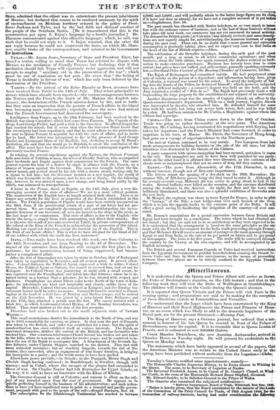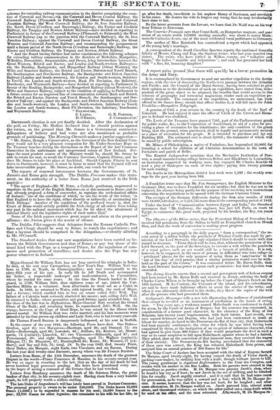Tuesday's Gazette notified some appointments; namely—
The Honourable Charles Augustus Murray, to be Extra Groom in Waiting to the Queen. The same, to be Secretary of Legation at Naples. The Reverend Frederick Anson, to be Canon of St. George's Chapel, at Wingace Castle, in the room of the Honourable Richard Bruce Stopfcad, deceased. Mr. Edward Smirke, to be Solicitor-General to the Prince of Wakes.
The Gazette also contained the sukoined notification
" Railway Department, Board of Trade. Whitehall, list Dec. 1844. "Notice is hereby given, that the Board constituted by the minute of the Lords of the Committee of the Privy Council for Trade, of 24th Augtest 1844, for the transaction of railway-business, having had under consideration the following • schemes for extending railway communication in the district comprising the counties of Cornwall and Devon—via, the Cornwall and Devon Central Railway, the Cornwall Railway (Plymouth to Fahnouth), the Gneat Western and Cornwall Junction Railway, the West Cornwall Railway, the St. Ives Junction Railway, the North Devon (Crediton and Barnstaple) Railway, the Exeter and Crediton Railway, the Torquay and Newton Abbott Railway—have decided on reporting to Parliament in favour of the Cornwall Railway (Plymouth to Falmouth), the West Cornwall Railway (up to the junction with the Cornwall Railway), the St. Ives Junction Railway; against the Cornwall and Devon Central Railway, the Great Western and Cornwall Junction Railway; and recommending the postponement until a future period of the North Devon (Crediton and Barnstaple) Railway, the Exeter and Crediton Railway, the Torquay and Newton Abbott Railway. "And the Board having further had under consideration the following schemes for extending railway communication in the districts of Berkshire, Hampshire, Wiltshire, Dorsetshir• e, Sornersetshire, and Devon, lying 'intermediate between the Great Western, Bristol and Exeter, and London and South-western Railways— viz. the Reading, Basingstoke, and Hungerford Railway (Great Western), the Wilts and Somerset Railway, the Bristol and Exeter, Durston and Yeovil Branch, the Southampton and Dorchester Railway, the Basingstoke and Dideot Junction Railway (London and South-western), the London and South-western, Salisbury to Yeovil, the London and South-western, Hook Pit Deviation, the Salisbury, Dorchester, and Weymouth Railway—have decided on reporting to Parliament in favour of the Reading, Basingstoke and Hungerford Railway (Great Western), the Wilts and Somerset Railway, subject to the condition of applying to Parliament in a future session for an improved line of communication towards Bath and Bristol, the Bristol and Exeter, Durston and Yeovil Branch, the Southampton and Dorchester Railway; and against the Basingstoke and Dideot Junction Railway (London and South-western), the London and South-western, Salisbury to Yeovil, the London and South-western, Hook Pit Deviation, the Salisbury, Dorchester, and Weymouth Railway. " DALHOUSIE, S. LASSOS, Cl. R. PORTER, D. O'Brums, J. CODDINGTON: . Dartmouth election is not yet finally decided. After the declaration of the poll, on Friday, Mr. Moffatt declared that he should petition against the return, on the ground that Mr. Somes is a Government contractor. Allegations of bribery and bad votes are also mentioned as probable grounds of petitioning. The Morning Chronicle makes a jocular suggestion—
Mr. Somes, though a Conservative, as the Governor of the New Zealand Company would not be a very pleasant companion for Mr. Under-Seeretary Hope on the Treasury benches during the disensmons on the Report of the late Commons Committee on the unfortunate and misgoverned colony of New Zealand. PerbaN the most prudent course of the Ministry would be, should Mr. Somes be able to retain Ins seat, to recall the Currency Governor, Captain Fitzroy, and induce Mr. Somes to take his place at Auckland. Should Captain Fitzroy be sent down to Dartmouth, however, it must be borne in mind that the freemen will not take inconvertible paper. her. Somes, no doubt, can vouch for this." .
• The reports of renewed intercourse between the Governments of St. James's and Rome gain strength. The Dublin Freeman makes this statement, on the authority of a letter from Rome just received in the Irish capital
" The agent of England—Mr. W. Petre, a Catholic gentleman, empowered to • negotiate on the part of the English Minister—is at this moment in Rome; and he has alreadypreposed a form of concordat, to regulate the ecclesiastical affairs of Ireland; , one of the conditions of which,' to use the words of the writer, is that England is to have the right, either directly or indirectly, of nominating the Irish Bishops.' Another of the conditions of the proffered treaty is, that the Court of Borne would strictly prohibit the Irish clergy of all orders from taking any part in the national movement which has for its object the attainment of rational liberty and the legislative rights of their native land."
• Some of the Irish papers express great anger and alarm at the proposed alliance: the Nation gives it the assent of silence.
The Dublin Pilot suggests that delegates from the Roman Catholic Prelates and Clergy should be sent to Rome, to watch the negotiations; and that a layman should be comprised in the delegation,—evidently alluding to Mr. O'Connell.
The Standard denies that any new negotiations have been carried on between the British Government and that of Rome; or any but those of the usual kind with the Pope as a temporal Prince, for the regulation of commerce and protection of travellers; and denies also the Pope has any power whatever in Ireland.























































 Previous page
Previous page